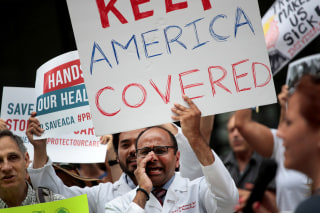The remaining tax bill being hammered out among Republicans in Congress wholly kills one of the crucial controversial provisions of the affordable Care Act — the mandate.
The mandate requires essentially all and sundry to have some kind of medical insurance or pay a excellent. The Supreme court calls it a tax.


Demonstrators protest changes to the most economical Care Act on June 22, 2017 in Chicago, Illinois. Senate Republican's unveiled their revised health-care invoice in Washington after high-quality tuning it in behind closed doors. Scott Olson / Getty images
It became intended as an incentive so younger, more healthy people who may additionally not think they want or want medical health insurance would get coverage anyway. It turned into also a way of creating sure americans do not wait except they're unwell to buy coverage.
medical health insurance agencies want these match americans within the mix, paying premiums, since it's unaffordably costly to cover only ailing people.
related: GOP plans to repeal Obamacare mandate
"Having younger and healthy individuals as part of the insurance pool helps keep premiums manageable for every person," a coalition of health and customer businesses, including the American Diabetes association, the American melanoma Society cancer motion network and the American Lung association, talked about in a joint commentary.
assurance organizations have already talked about that without the mandate, they'll have to raise premiums and pass on other prices to americans who do have health insurance.
however Republicans word that american citizens in fact dislike being advised what to do and that they have characterized the mandate as forcing people to buy a product they don't want.
The Congressional funds workplace estimated that ditching the mandate will support in the reduction of the federal price range deficit, as a result of fewer individuals will buy medical insurance at charges subsidized via the federal govt. The CBO projects rate reductions of $338 billion between 2018 and 2027.
"The variety of americans with medical insurance would decrease with the aid of 4 million in 2019 and 13 million in 2027," the CBO referred to.
linked: Rubio comes out against tax bill
"those outcomes would turn up primarily as a result of more healthy people can be less prone to achieve assurance and because, peculiarly in the nongroup market, the ensuing increases in premiums would cause more americans to not buy insurance."
The nongroup market refers to individuals who buy their personal medical insurance. Most american citizens are coated by using an organization. Many are covered by using Medicare or Medicaid, a few get military health benefits and the so-known as Obamacare markets have been supposed to aid the relaxation get "nongroup" health insurance.
related: The capabilities health consequences of the GOP tax bill
medical health insurance premiums during this nongroup market will go up by way of 10 %, the CBO estimated.
this could hit one group in particular, in line with the Commonwealth Fund, which conducts studies in fitness coverage and released a file Thursday on the within your budget Care Act.
"americans who buy their personal coverage on the individual market and who've incomes above four hundred percent of the federal poverty degree (about $48,200 for an individual and $98,400 for a family unit of 4) — the threshold for ACA top rate subsidies — would face the brunt of the premium enhance," it said.
A forty-year-historical client buying medical insurance on one of the vital federal exchanges would pay $556 greater in premiums in North Dakota and $1,264 more in Nebraska, the group calculated.
The $1.5 trillion tax plan is the outcomes of negotiations between Republicans within the apartment and Senate, which each passed separate tax expenses that had to be reconciled. the two bodies will have to vote this remaining edition — some disagreements are nevertheless being labored out — soon.
Komentar
Posting Komentar